Silent Angel Munich M1T streamer, Bonn N8 network switch, and Forester LPS by David Abramson
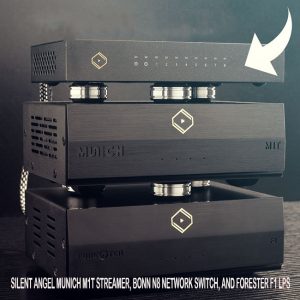
A stream(er) of conscious poesy
 I told Silent Angel dealer Rob Fritz, the man who graciously facilitated this review of these here Silent Angel units, that I thought it would be difficult to wax poetic about a streamer even if I liked it. I mean, it either works smoothly and is better than a Mac mini/better than the newest Generation 9 Bluesound Node (or whatever version they’re up to now), or it isn’t. Heck, I’d almost rather review an interconnect. Rob told me if anyone could wax poetic about a 1200-dollar streamer, it was me. I still don’t know whether that was a compliment…
I told Silent Angel dealer Rob Fritz, the man who graciously facilitated this review of these here Silent Angel units, that I thought it would be difficult to wax poetic about a streamer even if I liked it. I mean, it either works smoothly and is better than a Mac mini/better than the newest Generation 9 Bluesound Node (or whatever version they’re up to now), or it isn’t. Heck, I’d almost rather review an interconnect. Rob told me if anyone could wax poetic about a 1200-dollar streamer, it was me. I still don’t know whether that was a compliment…
What it is, what it was, what it SHALL be
 The Silent Angel Munich M1T is… a 1200-dollar streamer. It’s based on the raspberry pi4, but not entirely, and it’s homed in a sexier aluminum black box than any Raspberry Pi I’ve ever seen. (I hate clear acrylic boxes). Moreover, digitally speaking, you can do a lot with it. It isn’t even Swiss or a knife or a member of an army… or red. With the M1T, though, it doesn’t matter if you’re a Roon lover or an ‘Audirvana sounds better(!)’ kinda guy or the kinda guy who likes to use native apps cause they may offer some sonic advantage (I, for one, hear it as such). Whichever way and whatever time of day you like it, Silent Angel has you covered. [NB: Throughout and forthwith, poetic license being what it is, Silent Angel may be contracted to SA because… laziness forsooth]. For this review, I used the SA M1T streamer exclusively as powered by their lower-tiered SA Forester F1 linear power supply. I did this in the main because most of us are high-end types who wouldn’t be caught dead, NOT using the optional linear power supply for anything from a toaster to a cappuccino maker if we could obtain/afford it. Am I right?! Let’s face it; if that weren’t the case, you’d be over at consumerreports.com right now checking out which Bose Wave radio sounded ‘biggest.’
The Silent Angel Munich M1T is… a 1200-dollar streamer. It’s based on the raspberry pi4, but not entirely, and it’s homed in a sexier aluminum black box than any Raspberry Pi I’ve ever seen. (I hate clear acrylic boxes). Moreover, digitally speaking, you can do a lot with it. It isn’t even Swiss or a knife or a member of an army… or red. With the M1T, though, it doesn’t matter if you’re a Roon lover or an ‘Audirvana sounds better(!)’ kinda guy or the kinda guy who likes to use native apps cause they may offer some sonic advantage (I, for one, hear it as such). Whichever way and whatever time of day you like it, Silent Angel has you covered. [NB: Throughout and forthwith, poetic license being what it is, Silent Angel may be contracted to SA because… laziness forsooth]. For this review, I used the SA M1T streamer exclusively as powered by their lower-tiered SA Forester F1 linear power supply. I did this in the main because most of us are high-end types who wouldn’t be caught dead, NOT using the optional linear power supply for anything from a toaster to a cappuccino maker if we could obtain/afford it. Am I right?! Let’s face it; if that weren’t the case, you’d be over at consumerreports.com right now checking out which Bose Wave radio sounded ‘biggest.’
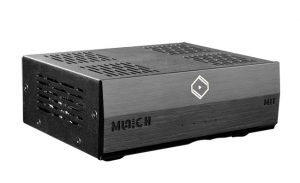

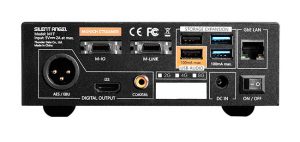
Taste The Rainbow
In a similar vein, and this for once is not a non-sequitur, I positively love tiramisu! It’s actually the name of one of the ‘colors’ Silent Angel’s up-rated DC power cables come in. [Objectivists– this is your trigger warning. Look away right now].
That’s right; you can choose the ‘level’ of your DC power connector cables that connect the SA Bonn N8 switch and M1T streamer to the aforementioned linear power supply. And the different levels have names; Cute names! They are, in order of ‘superiority’ (and price!), Light Orange, Black Tiramisu, and the ones I received, Snowy White. Ok, there’s also a Zebra Plaid for you influencers that simply must be on trend. I’m dead serious (for once). What’s more, like most things in life, they’re all conveniently and immediately available from Jeff Bezos! (here).
Now, I’m not gonna compare a Snowy White all-silver DC wire to a partial copper and partial silver Black Tiramisu as I do still sort of have a social life (which mostly involves Pickleball; one must prepare thoroughly for retirement in Florida), and some other non-audio related things to see and do (never aquariums), but I can guarantee you some people will compare them and when they do, I’ll be happy to read that review relieved they did it so I didn’t have to.
In the meanwhile, my entire stack of Angels was connected via Snowy White’s ‘all silver’ DC leads, and that let me rest in peace knowing I had– the innocent snowy best:)
No Tiramisu for you!
Hey– how YOUZ doin’??!
As was the case with the superb Meitner MA3 I had in house for a time which used the wonderful sounding though fatally functionally troubled Mconnect app, I preferred the M1T’s sound from its own native vitOS app. Speakin’ a which, I pictured some guy from a Brooklyn pizza place every time- “Hey how ya doin?’ I’m Vito and I got a app for yaz. Buy it now, eh!?”

Well, Vito makes a really good app! And a really good pie, half sausage, half mushroom. The thing is really easy to use and intuitive. You open the app and just choose Tidal or Qobuz or Roon or whatever strikes your fancy, and it plays. If you have to change from USB to AES, that’s also one click-change away, and bada bing bada boom, Vito gets it done. Of course, for extra authenticity, he insults your choices by referring to Coax and AES as ‘legacy’ outputs, whereas USB suffers no such derision. As with most non-Vito OSs, you can play entire albums or make playlists, but no matter whose app I’m working with, Vito’s or some udder guy’s, I always do the former and never the latter. I’m not trying to be DJ Khalid over here (except some Sundays over brunch, maybe). I’m a guy who wants to listen to this whole album or that one. Roon radio, I’ll admit, is nice, though. Yeah, until Chat GPT Music makes its debut, Roon’s pretty good at guessing what I might like next, so I do like to let Roon DJ for me when I’m in the mood. There’s also less risk it will go rogue and destroy humanity at some point in the next 5 or 6 years. I think. Of note, while I mention above, I preferred the sound from the MA3 dac via the native app (Mconnect), as I also mention, Mconnect’s performance as a ‘functional’ daily driver app… well, the less said, the better. I want to stress Vito is a much smoother, more polished operator. I came to prefer it to the native Lumin app I used with my dearly departed Lumin U1 mini streamer. Only Innuos’s Sense app gets a more firmly pressed-into-paper seal of approval. Of note, there is no option to control volume digitally with the M1T from, say, Roon, or for that matter, from Vito’s app. So if your integrated amp is say, a ‘legacy’ non-remote Leben or an Audio Note, you’re gonna be getting up off your couch. A lot. It’s fine; it’ll get you in shape for Pickleball.
Ahhh but the sonics…
As compensation for having to get off your couch for a non-remote amp via the M1T/Forester F1, Joya Mooi’s When He’s Seen was suitably impactful and spacious. Out of Love from the same album features Joya’s sultry tones alternating at times with a sax that tries to out-sultry her but doesn’t quite. Relaxed, expansive, and meaty; no hints of ‘the digital’ here. No bit of edge or forwardness as sometimes is heard with the Mac Mini and suitably audiophile software. In sum, a worthwhile upgrade to my ear(s). Overall the M1T/Forester F1 combo is versatile, compact, very well made, well finished and can pretty much give good signal any which way you wanna employ it. Vito’s app confirmed itself as best in terms of sound quality, and it’s well thought out, doesn’t crash, and is easy to navigate.
Full. Silent. Angel.
Let’s max it out, baby! If we’re gonna compare network switches connected via Snowy White Plaid Tiramisu we have now entered the realm of the truly friggin’ audiophile in the row right next to the one reserved for ‘fuse people.’ (Our esteemed editor Clement and I both friggin’ love QSA fuses- don’t get me started!)
Since we’re already in the realm of purples and oranges and ethernet cables etc., why not go Fool Monty and listen to the four or five tracks people in such realms cherish? I’m speaking, of course, of Patricia Barber’s disparate albeit super well-recorded ramblings over bongos as, let’s face it; all my elitist genre biases aside, hearing differences between network switches while blasting bootleg Metallica tracks from their 1973 concert in Cleveland or something is damn near impossible no matter how high res your system.
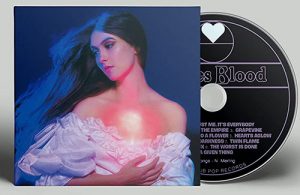 Sadly, damnably sadly, while listening to Patricia Barber warble her strange brew of atonality and poesy over the exceedingly monitor-like Acelec Model One loudspeakers, I DO hear differences. The silent angel switch in sum, is maybe a bit warmer and smoother than the Netgear 308T; a bit more laid back. The 308T, in turn, is a touch bolder and more forward and perhaps a bit pacier.
Sadly, damnably sadly, while listening to Patricia Barber warble her strange brew of atonality and poesy over the exceedingly monitor-like Acelec Model One loudspeakers, I DO hear differences. The silent angel switch in sum, is maybe a bit warmer and smoother than the Netgear 308T; a bit more laid back. The 308T, in turn, is a touch bolder and more forward and perhaps a bit pacier.
Indie artist Weyes Blood’s ‘Twin Flame’ from ‘And in the Darkness, Hearts Aglow’ seemed to glow and linger a bit more with the SA switch in the system. It was as if a hit of grain was removed from the presentation of the 308T, or at least, that’s how it came across to me.
The magnitude of difference is akin to an interconnect change or perhaps the addition of some anti-resonant feet beneath a dac if not quite a dac change.
A Tale of two switches
Now lemme tell you about the Netgear 308T. The 108T v2 is the switch recommended by a man whose ears I trust, Fredrik Lejonklou. He was apparently experimenting lots with routers and switches during the optimization of his streamer/dac the Kalla, and he hit upon the Netgear 108T as an ideally musical companion, which he felt upped the reality factor of his music when inserted between Amplifi HD router (his preferred router and the one I now use) and streamer. Later, the Lejonklou distributor Tom O’keefe told me that he felt the 308T was even a step forward musically from the 108T, and I sprung for the 60 bucks it cost from Bezos to have it here. I haven’t done a serious head-to-head yet, but preliminarily it is at least as good as the 108T. By the way, this 308T switch reportedly sounds even better when utilizing the power supply from the 108T!! So that’s how I’m using it for this comparo. Throughout my listening, I kept feeling the 308T was a bit more forward sounding, a bit bolder. Comparatively, the silent angel switch with linear power supply came across as a bit smoother and more reserved, and perhaps a bit more expansive imagistically. Hopefully, Hugh Grant will permit me to say horses for courses here, as that is what I’m gathering between these two contenders for Audio Science Review’s component of the year award. I kid! I kiiiiiiid! It will probably be an ethernet cable. [Can I get a rimshot??!]
But seriously, you CAN hear the differences. At least I can. Quantifying them even ‘subjectively’ with florid prose, at least for me, is not for the faint of heart. Let’s say the short version is the Silent Angel lights a cigarette and hangs out in its silk smoking jacket all day and wears expensive Turkish Sanuk slippers, and the 308T is the guy in a Springsteen cover band his daughter at Brown has a crush on. Ok, so that’s a rough sketch/exaggeration, but the outlines are there. Neither of them transmits data any differently than the other, so there’s something going on, maybe with RFI sensitivity or clock jitter, etc., but that’s above my pay grade (which incidentally is exactly zero dollars for this article or any other I’ve ever written. Damnably sad). Continuing, when Carmen Gomes sings ‘In the Evenin’ Mama’ on her blues album, the Silent Angel’s bit of extra expansiveness and ‘smoothening’ is apparent. Her voice is a bit more silky and sultry than via the 308T. But, if your speakers lean a bit warm and smooth, you might prefer the 308T’s somewhat bolder delivery. Going back and forth from switch to no switch at all, Joya Mooi’s track ‘Tomorrow’ from the Crystal Gates album seemed even a bit more spacious and relaxed with the SA network switch in the chain powered via the SA LPSU. Even if, at times, it was hard to put words to, there was a certain relaxation maybe the Silent Angel switch brought to the proceedings in general over and above the solo stock M1T streamer, which, let’s face it, was already pretty good and a Swiss army knife to boot.
The over and out
 As compared with a higher-end streamer like the 3200 dollar Innuos Pulse I’ve recently had experience with (and ended up purchasing), well, there is perhaps a bit more expansiveness and instrumental separation with the Innuos as compared with the full Silent Angel stack. On a track such as Kathleen Frances singing ‘Boy’ from her album Through the Blue, the piano was a bit more solid and defined a distinct entity from her voice, which took on an extra frisson of solidity and weight. Such differences, though, were evident only by way of comparison between the two players, each playing the same track.
As compared with a higher-end streamer like the 3200 dollar Innuos Pulse I’ve recently had experience with (and ended up purchasing), well, there is perhaps a bit more expansiveness and instrumental separation with the Innuos as compared with the full Silent Angel stack. On a track such as Kathleen Frances singing ‘Boy’ from her album Through the Blue, the piano was a bit more solid and defined a distinct entity from her voice, which took on an extra frisson of solidity and weight. Such differences, though, were evident only by way of comparison between the two players, each playing the same track.
If I had only had the Silent Angel on hand, I would never have noticed such things. Kathleen sounded perfectly real and resonant via either streamer. Here the Silent Angel switch and power supply added a bit more expansiveness and space to either streamer, and I came to prefer to use the Bonn 8 switch and Forester power supply with both and also with the Mac mini—less edge, more music all around. Perhaps if your interwebs contain fewer cobwebs than mine, you wouldn’t need it/care. Similarly, if you don’t believe in such things or in Santa Claus, so much the better for your wallet! Also, genuinely, where’s your sense of wonder and curiosity? For shame. The Silent Angel stack laced together with Snowy White wires was positively a delight to hear and to operate. The happy stack (very nearly) competed with a significantly more expensive streamer on hand and never failed to operate smoothly via whichever connection I preferred or to play music engagingly via whichever streaming service I fancied at the moment. It comes beautifully packaged, feels very solidly constructed, and takes up minimal listening room real estate. I also love that you can use the Forester linear power supply with the M1T alone, add the Bonn N8 network switch later as funds allow, and power it all via the self-same power supply. A neat trick! I loved my time with the Silent Angel stack and look forward to hearing and writing about more products from SA! Oh, and on a personal note, I’ll really miss Vito! What a guy, eh? And what an app! Am I right???! C’mon!! Fist bump! Pound it!
Now youz guyz take care ya selves… ya heer!?
I bid you peace



![]()
david abramson
Specifications:
Silent Angel Munich M1T
Retail price: 1099.00
Power Input: (DC) 5V/2A at max
Power Use: 10W at max
Interface:
Digital Outputs
AES/EBU; I2S; Coaxial
– Supports up to PCM 384KHz and DSD 5.6M (DSD128)
USB Audio
– Supports up to PCM 768KHz and DSD 11.2M (DSD256)
Extension
– USB3.0*2, USB2.0*1 for extra storage
– M-IO, M-LINK for peripheral access
1000Mbps Ethernet Port
– works well with high-performance NAS(Network Attached Storage)
– connecting to the Gigabit LAN port of a router or audio switch
Music Format
– AAC, M4A, MP3, OGG, FLAC, WAV, ALAC, DSD(DSF, DFF), WAV64, AIFF, CUE files, WMA, APE
– Gapless playback supported
MQA Handling
– The M1T will transmit the signal to the DAC, which supports MQA decoding.
MQA is supported only by connecting to the USB-audio port.
Dimensions: 6.11(W) inch x 1.99(H) inch x 4.34(D) inch
Weight: 2.21lbs
Bonn N8 Network Switch
Eight Audio Grade 100/1000 Base-T Gigabit Ethernet ports
Superior main clock accuracy
Customized Silent Angel Noise Absorber (SANA)
Two noise isolators for main power circuit
Two noise isolators for clock generator circuit
Medical grade power adapter
Retail price: 549.00
Forester F1 Linear Power Supply
Dimensions: 155mm (W) x 115mm (D) x 58mm (H)
Device Weight: 1.3KG
Input: 230VAC or 115VAC 50/60Hz (with voltage selector)
Output: Dual 5V@2A
Output Connectors: DC PLUG *2, USB Type-A Female Connectors *2
LED indicators: Status LED *2, Over-Temperature-Protection LED *2
Retail price: 599.00
Contact: silentangel.com or Audioartcable.com to purchase
David’s Associated Equipment
Digital source:
Innuos Pulse streamer; Mac Mini 2014 w/Roon and Audirvana Studio; Holo Audio KTE May DAC
Amplification:
Lejonklou Boazu integrated amplifier
Loudspeakers:
Devore 0/96; Acelec Model One
Cables:
Audio Art Cable Statement e SC Cryo speaker wires; Belden 8402 interconnects; Audioquest Carbon USB cable
Accessories:
Symposium Svelte Shelf Plus and Rollerblock Jr. footers (under Holo KTE May DAC); PS Audio P12 power regenerator
One thought on "Silent Angel Munich M1T streamer, Bonn N8 network switch, and Forester LPS by David Abramson"
Leave a Reply
Stereo Times Masthead
Publisher/Founder
Clement Perry
Editor
Dave Thomas
Senior Editors
Frank Alles, Mike Girardi, John Hoffman, Russell Lichter, Terry London, Moreno Mitchell, Paul Szabady, Bill Wells, Mike Wright, Stephen Yan, and Rob Dockery
Current Contributors
David Abramson, Tim Barrall, Dave Allison, Ron Cook, Lewis Dardick, Dan Secula, Don Shaulis, Greg Simmons, Eric Teh, Greg Voth, Richard Willie, Ed Van Winkle, and Rob Dockery
Music Reviewers:
Carlos Sanchez, John Jonczyk, John Sprung and Russell Lichter
Site Management Clement Perry
Ad Designer: Martin Perry



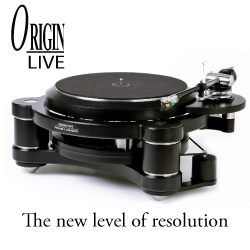


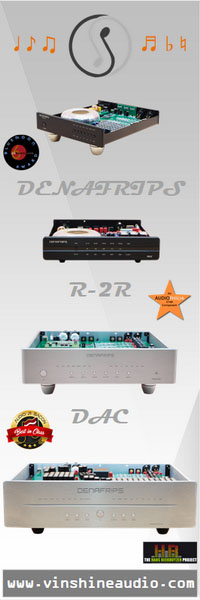
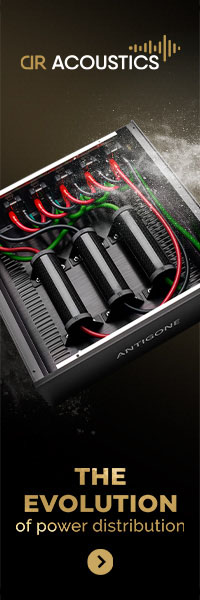
The MIT is supposedly only a transport, with no onboard DAC. The review makes no mention of a DAC in use; was this actually a review of the M1 streamer?!?!